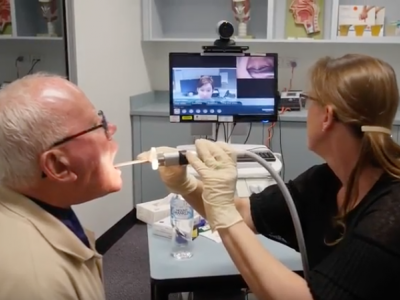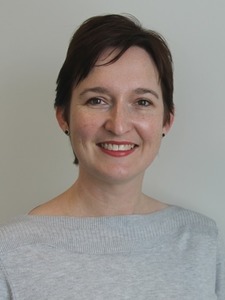
Speech pathology telepractice services at the Royal Brisbane & Women’s Hospital.
A University of Queensland researcher has been awarded one of five inaugural Metro North Clinician Research Fellowships to develop her work in speech pathology telepractice services.
The fellowship will allow Dr Clare Burns, Lecturer in the UQ School of Health and Rehabilitation Sciencesand Advanced Speech Pathologist at the Royal Brisbane & Women’s Hospital (RBWH), to implement and evaluate two new models of care supporting patients with swallowing disorders.
For the first model, patients will access swallowing therapy utilising a telepractice application via their mobile device coupled with reviews via videoconferencing with their speech pathologist.
This personalised approach will enable patients to access therapy when and where it is convenient to them and limit the need for travel to health facilities.
The second project will develop a clinical model delivering the instrumental assessment, Fibreoptic Endoscopic Evaluation of Swallowing (FEES) via telepractice.
The intent is to increase the efficiency of speech pathology diagnostic services and support the expansion and sustainability of FEES services across Metro North Hospital and Health Services (MNHHS).
 It is anticipated that these new service models will enhance patient access to dysphagia assessment and rehabilitation across MNHHS while delivering speech pathology service benefits,” Dr Burns (pictured, left) said.
It is anticipated that these new service models will enhance patient access to dysphagia assessment and rehabilitation across MNHHS while delivering speech pathology service benefits,” Dr Burns (pictured, left) said.
“Once confirmed, there is potential for these new telepractice models to be expanded for use by other patient groups and clinical services.”
The research will be conducted in conjunction with speech pathologists across MNHHS, specialist telepractice staff from the RBWH, and Queensland Health’s Telehealth Support Unit.
Dr Burn’s mentors for this four-year, part-time fellowship will be UQ’s Professor Elizabeth Ward and Dr Annie Hill, and Dr Sanjeewa Kularatna from The Australian Centre for Health Services Innovation.
Dr Hill said the research will build upon Dr Burn’s previous research in which she developed and evaluated a telepractice service for patients with head and neck cancer.
“The success of her past research directly led to the service being embedded within the Speech Pathology Department at the RBWH, and this new program of research will expand into other telepractice models of care and other patient groups who experience swallowing disorders,” Dr Hill said.
“We expect the outcomes will inform the implementation of these telepractice models of care in speech-language pathology, and will have the potential to enhance service provision to patients living with the impact of swallowing disorders.”



